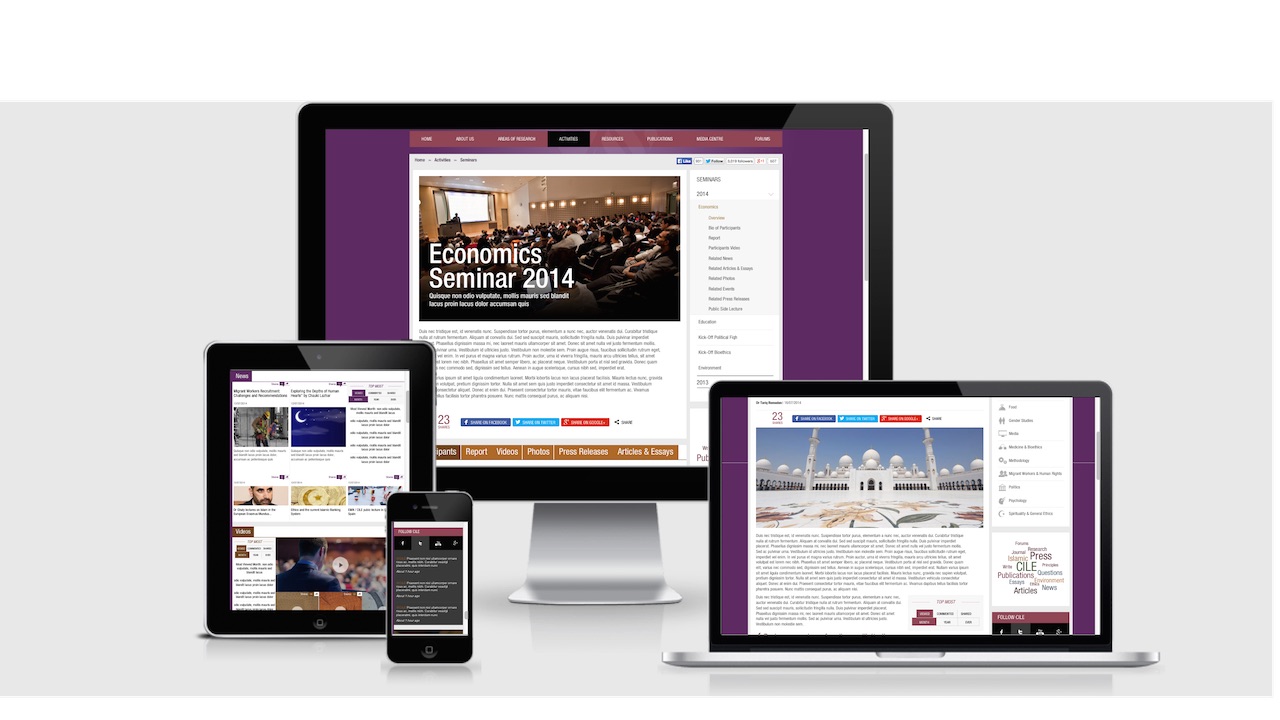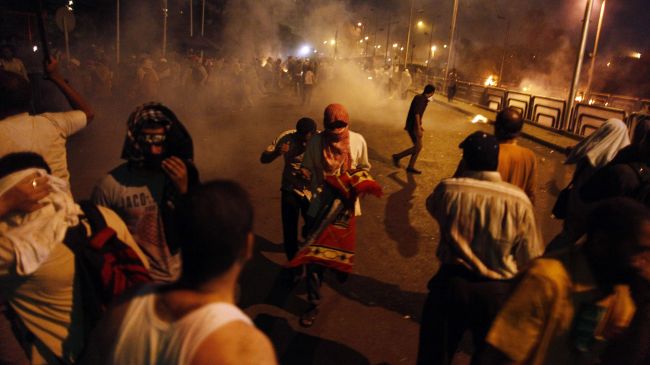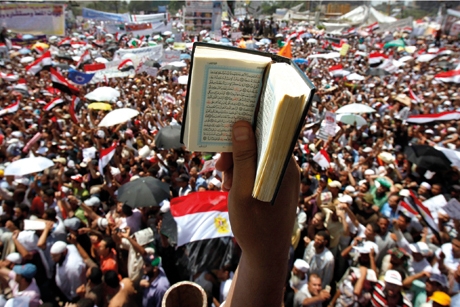During a recent visit to the United States, I was asked by intellectuals and journalists: Were we misled, during the Arab awakening, into thinking that Muslims could actually embrace democratic ideals?
The short answer is no. Participants in the recent violent demonstrations over an Islamophobic video were a tiny minority. Their violence was unacceptable. They do not represent the millions of Muslims who have taken to the streets since 2010 in a disciplined, nonviolent manner to bring down dictatorships.
Many Americans were nonetheless shocked by the chaos and bloodshed across Muslim countries, believing that they had come generously to the aid of the Arab peoples during the uprisings. But Arabs, and Muslims in general, have a longer memory and a broader view. Their mistrust is fueled by America’s decades-long support for dictators who accommodated its economic and security interests; by the invasions of Iraq and Afghanistan; by the humiliating treatment of prisoners at Abu Ghraib and Guantánamo Bay; and by America’s seemingly permanent and unconditional support for Israel.
The United States and its European allies would be well advised to examine why Muslims are seething. Withdrawing from Afghanistan, respecting United Nations resolutions and treaty obligations with regard to Palestine, calling back the killer drones and winding up the “war on terror” would be excellent places to start.
However, the time has come to stop blaming the West for the colonialism and imperialism of the past. Muslim-majority societies must jettison their historic posture as victims and accept that they are empowered actors, as millions of Arabs demonstrated last year by coming out into the streets and changing the course of history.
The timeworn dichotomy of “Islam versus the West” is giving way to an era of multipolar relations. The world’s economic center of gravity is shifting eastward. But the growing prominence of China, India and Russia, and of emerging powers like Brazil, South Africa and Turkey, does not automatically guarantee more justice and more democracy. Some Muslims are too quick to rejoice at the decline of American power. They seem unaware that what might replace it could well lead to a regression in social and human rights and to new forms of international dependency.
The Arab peoples, like those throughout Latin America, Africa and Asia, cannot, and do not want to, disregard the cultural and religious traditions that have long defined and nurtured them. As they pursue values like freedom, justice, equality, autonomy and pluralism, and new models of democracy and of international relations, they need to draw on Islamic traditions. Islam can be a fertile ground for political creativity — and not an obstacle to progress, as Orientalist thinkers in the West have so often claimed.
The Arab world, and Muslim-majority societies, need not only political uprisings, but also a thoroughgoing intellectual revolution from within that will open the door to economic change; to spiritual, religious, cultural and artistic liberation; and to the empowerment of women. The task is not an easy one.
A struggle for political and religious authority is taking place in these societies. There are deep divisions among Sunnis — traditionalists, secularists, reformers, Sufi mystics — and also between Sunnis and Shiites.
At the moment, Arab thought has been hindered by a barren ideological construct that pits secularists against Islamists, making it impossible for either to indulge in in-depth reflection about the intellectual limitations that afflict both of them.
Westernized secular elites, for all their talk of democracy and human rights, often are carrying over former colonial agendas and are deeply disconnected from the people they claim to represent. Or if they aren’t — like some grass-roots movements on the left — their influence is marginal at best. Some have collaborated with dictators, accepted cronyism or benefited from official corruption. Others have remained close to the inner circles of the military (as in Egypt, Tunisia, Syria and Iraq). By standing against any overlapping of religion and politics, they have put forward a vision of democratization that is incoherent and disconnected from Islamic memories and traditions.
The Islamists have legitimacy, having paid a heavy price in opposing dictatorships for decades. They have made electoral gains in Morocco, Egypt and Tunisia by adapting to the shifts in power brought about by the protesters and cyberactivists. Yet they are facing contradictory expectations: they must remain faithful to their Islamic credentials while facing foreign pressure with regard to democratic processes, economic policies and relations with Israel. No figure embodies these contradictions more than Mohamed Morsi, Egypt’s new president, who tried last week to forcefully rebut President Obama’s absolute defense of free speech at the United Nations. But calling for limits on offensive speech is no solution. We don’t need more laws. We need courageous scholars and intellectuals who are willing to discuss topics their fellow Muslims don’t want to hear: their failings, their tendency to play the victim, the need to take responsibility for their actions. Only that sort of leadership will halt the tide of religious populism and emotionally driven blindness of the masses.
While the example of Turkey’s ruling Justice and Development Party, known as the A.K.P., is interesting, it cannot be a reference for the entire Middle East. Turkey has a unique history; its challenges are not the same as those of the Arab world. The Arab Islamists, even as they celebrate their electoral successes, may well be entering a far more sensitive period of their history. They may lose the Islamic credibility they had as opposition forces, or be obliged to change and adapt so much that their political program is abandoned. Winning might be the beginning of losing.
Meanwhile, Salafi and Wahhabi groups with literalist interpretations of Islam have become more visible and politicized over the last five years. Having for decades refused political participation — equating democracy with kufr (rejection of Islam) — they are now slowly engaging in politics.
Some of these groups (known as salafi jihadists) have turned to violent radicalism. Others, financed by Islamic institutions in Saudi Arabia and Persian Gulf oil monarchies like Qatar and Bahrain — supposed allies of the United States — have entered mainstream politics, where they promote a religious, anti-democratic populism that plays on emotions, demonizes the West (especially America) and actively undermines the struggle for democratic reform. There is a danger that the model of Afghanistan — where in the 1980s the Taliban, supported by the Saudi and American governments, became the main force of resistance to Russian domination — may be repeating itself.
There can be no true democracy in the Middle East without a profound restructuring of economic priorities, which in turn can come about only by combating corruption, limiting the prerogatives of the military, and, above all, reconsidering economic relations with other countries and the gross inequalities of wealth and income within Muslim countries. The emergence of a dynamic civil society is a precondition of success. Concern for free and critical thought must take the form of educational policies to build schools and universities, revise outdated curriculums and enable women to study, work and become financially independent.
The Arab world has shaken itself out of its lethargy after decades of apparent resignation and silence. But the uprisings do not yet amount to a revolution. The Arab world must confront its historical demons and tackle its infirmities and its contradictions: when it turns to the task, the awakening will truly have begun.
Source: http://www.nytimes.com/2012/10/01/opinion/waiting-for-an-arab-spring-of-ideas.html?ref=opinion&_r=1&










what a nice article, very informative! And yes, we need,as Arabic Muslims, an intellectual revolution. The only key to development .
Muslim/Arab analysis evolves into schizophrenic proportions when applied to Pakistan…Given our corrupt and imbecile leaders “true democracy” is a far cry for us .…though I do hope that we can at some level become a “dynamic civil society”
Excellent thinking. Many thanks. When will the West allow Muslims to be as diverse in their views and beliefs as they are themselves? But we all look for simple (simplistic) answers and keys to understand complex peoples, events and histories. I like the English expression: ‘the bottom has a longer memory than the boot’. As a culture, as countries, we have mostly been the boot, and we’ve forgotten what those on the receiving end got from us (crusades, colonialism, corruption…). They say of the Irish, the problem is that they never forget. And of the British (I am British by birth) that they never remember!
Morocco is not an Arab country. It is an Amazigh (Berber if you like) country with Arab (French, Spanish, Phoenician, Greec…) influences.
The Arab world is an imperialistic cunstruct that I as an Amazigh take offence to. There is only one world, and it belongs to us all.
Go tell these people who came to the streets in masses that they where part of an « Arab awakening »…:
http://www.youtube.com/watch?v=vhptGL3g8sg
An intellectual should be more precise than this.
There is an old Berber proverb that says; “every vibration awakens all others of a particular pitch.” With the outbreak of the « Arab Spring awakening », the Maghreb is now vibrating to a new cosmos of freedom and participatory democracy. Patience will be rewarded.
i m from lebanon and i love all the nation and i dont believe in the arab world i believe better in a muslim world less rasist more union the best in us the best for its people..viva el hombre berber amazigh el libre..la gente de tarek eben ziad y de otros importante y amable gente..plz lets stop being far from each other lets learn to accept each other as we are
Morocco Arab?
The monarchy has used the Arab identities to find its legitimacy. Nowadays, because of the possible threats coming from the Islamists, and the legitimate pressure coming from the Amazighs, the political parties, and the influential Arabs/French class will hold on the monarchy to preserve the status quo.
Semantics are key here! Arab supremacists have always tried to stretch the meaning of « Arab » in order to gain more dominion over people. But the fact is that outside certain urban circuits, you’ll be hard-pressed to find any sign of Arab culture in Morocco proper. You’ll find tribes arabized through swords and continuous aggression, but most of them are fiercely anti-Arab.
Who gives a damn if you believe that Zeus built Olympus? Or that Somalia is undeniably Arab? Facts are stubborn, and they trump Arabist opinion.
However, it is just matter of one of two decades of Islamist’s fever will be over. Morocco will be heading the Spanish Model. The Rif will become more like the Basque state, the western Sahara will have at least a complete autonomy, while the center of Morocco will remain the Arab-French state.
It’s normal for Tariq Ramadan to talk about Arab world. For egyptians being arab and egyptian (non-arab) are not mutual exclusive. Egyptians know they have great civilization but accept their arabization. When egyptians were strong they tried to enforce this kind of thinking on berbers, that’s why some berbers have a grudge against egyptians.
BUT: this kind of thinking won’t work for berbers because they want to keep their language. It’s not on Tariq Ramadan to correct this, it is on us berbers of the world to explain where we are coming from (which is different from egyptians, although I’m not shure I totally understand egyptian thinking). Though Tariq Ramadan may not agree at least now he is open to dialogue (sorry to say in the past a few messages didn’t make it to this forum).